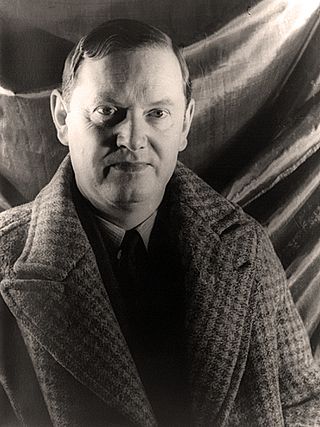
Arthur Evelyn St. John Waugh was an English writer of novels, biographies, and travel books; he was also a prolific journalist and book reviewer. His most famous works include the early satires Decline and Fall (1928) and A Handful of Dust (1934), the novel Brideshead Revisited (1945), and the Second World War trilogy Sword of Honour (1952–1961). He is recognised as one of the great prose stylists of the English language in the 20th century.
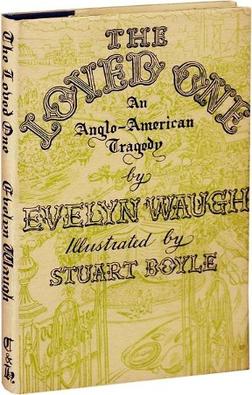
The Loved One: An Anglo-American Tragedy (1948) is a short satirical novel by British novelist Evelyn Waugh about the funeral business in Los Angeles, the British expatriate community in Hollywood, and the film industry.

William Lygon, 7th Earl Beauchamp,, styled Viscount Elmley until 1891, was a British Liberal politician. He was Governor of New South Wales between 1899 and 1901, a member of the Liberal administrations of Sir Henry Campbell-Bannerman and H. H. Asquith between 1905 and 1915, and leader of the Liberal Party in the House of Lords between 1924 and 1931. When political enemies threatened to make his homosexuality public, he resigned from office to go into exile. Lord Beauchamp is often assumed to be the model for the character Lord Marchmain in Evelyn Waugh's novel Brideshead Revisited.
Stephen James Napier Tennant was a British socialite known for his decadent, eccentric lifestyle. He was a central member of the socialite group referred to as "Bright Young Things" by the tabloid press of the time. Tennant was noted for his affected demeanor, appearance and behaviors.

Madresfield Court is a country house in Malvern, Worcestershire, England. The home of the Lygon family for nearly six centuries, it has never been sold and has passed only by inheritance since the 12th century; a line of unbroken family ownership reputedly exceeded in length in England only by homes owned by the British Royal Family. The present building is largely a Victorian reconstruction, although the origins of the present house are from the 16th century, and the site has been occupied since Anglo-Saxon times. The novelist Evelyn Waugh was a frequent visitor to the house and based the family of Marchmain, who are central to his novel Brideshead Revisited, on the Lygons. Surrounded by a moat, the Court is a Grade I listed building.

Aloysius is Lord Sebastian Flyte's teddy bear in Evelyn Waugh's novel Brideshead Revisited, published in 1945.
Archibald Ormsby-Gore, better known as Archie, was the teddy-bear of English poet laureate John Betjeman. Together with a toy elephant known as Jumbo, he was a lifelong companion of Betjeman's.

William Lygon, 8th Earl Beauchamp, JP, DL, styled as Viscount Elmley until 1938, was a politician in the United Kingdom. The eldest son of the controversial William Lygon, 7th Earl Beauchamp, sometime leader of the Liberals in the House of Lords, he was a Member of Parliament (MP) for East Norfolk before in 1938 inheriting his father's seat in the House of Lords. He remained a member there until his death.
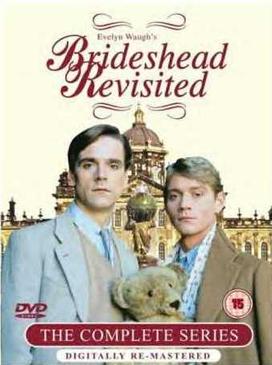
Brideshead Revisited is a 1981 British television serial starring Jeremy Irons and Anthony Andrews. It was produced by Granada Television for broadcast by the ITV network. Significant elements of it were directed by Michael Lindsay-Hogg, who handled the initial phases of the production, before Charles Sturridge carried on with the series. The first episode is credited to both men equally.

Brideshead Revisited is a 2008 British drama film directed by Julian Jarrold. The screenplay by Jeremy Brock and Andrew Davies is based on the 1945 novel of the same name by Evelyn Waugh, which previously had been adapted in 1981 as the television serial Brideshead Revisited.
Hubert John Duggan was an Argentine-born British Army officer and politician, who was Conservative Party Member of Parliament for Acton from 1931 until his death. He was an opponent of appeasement and broke the whip on several important occasions, voting to bring down Neville Chamberlain in 1940.
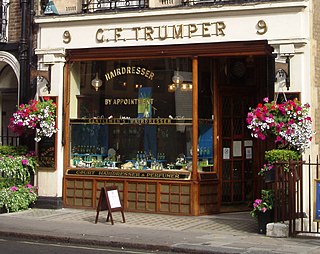
Geo. F. Trumper is a British men's barber and perfumer in London, England, which sells its own brand of men's fragrances and personal grooming products. It was established in 1875 by George Francis William Trumper as a Gentlemen's Barber Shop. George Trumper was not only an excellent barber but also a master perfumer, and he soon gained a reputation as such among the gentlemen of London's elite.

Hugh Patrick Lygon was the second son of William Lygon, 7th Earl Beauchamp, and, though often believed to be the inspiration for Lord Sebastian Flyte in Evelyn Waugh's Brideshead Revisited, Waugh told the Lygon family that this was not the case, Lygon was a close friend of the Waugh while at Oxford. A. L. Rowse believed the two to be lovers. They were both members of the Hypocrites' Club, along with their contemporaries Robert Byron, Murray Andrew McLean, and the Plunket Greene brothers, Richard and David, and of which Lygon was also president club, David Plunket Greene was a good friend of Hugh Lygon.

The Temple at Thatch was an unpublished novel by the British author Evelyn Waugh, his first adult attempt at full-length fiction. He began writing it in 1924 at the end of his final year as an undergraduate at Hertford College, Oxford, and continued to work on it intermittently in the following 12 months. After his friend Harold Acton commented unfavourably on the draft in June 1925, Waugh burned the manuscript. In a fit of despondency from this and other personal disappointments he began a suicide attempt before experiencing what he termed "a sharp return to good sense".

Lady Mary Lygon, known as Maimie, was a British aristocrat and Russian princess by marriage.
Ratcatcher is informal attire worn when fox hunting and consists primarily of a tweed jacket with tan breeches. Other specific items of clothing, forming part of the "uniform", might be prescribed by individual hunting clubs.
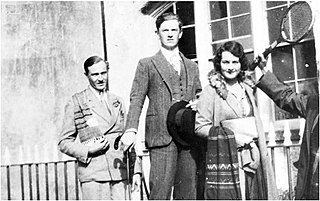
Alastair Hugh Graham was an honorary attaché in Athens and Cairo, an Oxford friend of Evelyn Waugh, and, according to Waugh's letters, one of his "romances". He is, together with Hugh Lygon and Stephen Tennant, considered the main inspiration for Sebastian Flyte in Brideshead Revisited.

Lady Sibell Lygon was an English socialite, part of the Bright Young Things.

Lady Dorothy Lygon was an English socialite, and one of the Bright Young Things. She served as a Flight Officer in the Women's Auxiliary Air Force during WWII, and later became an archivist.















